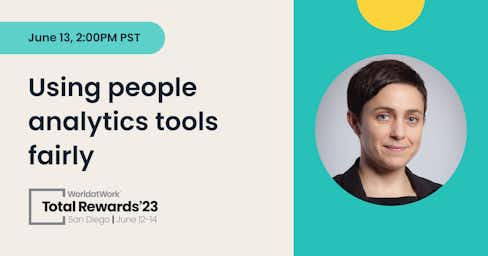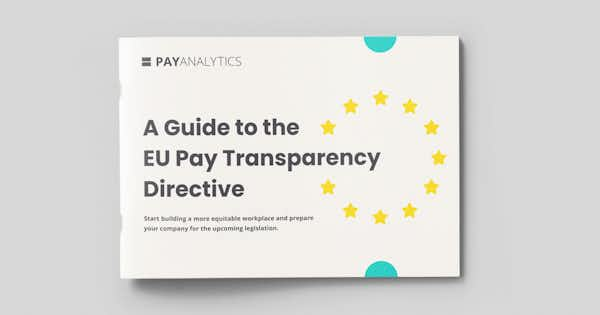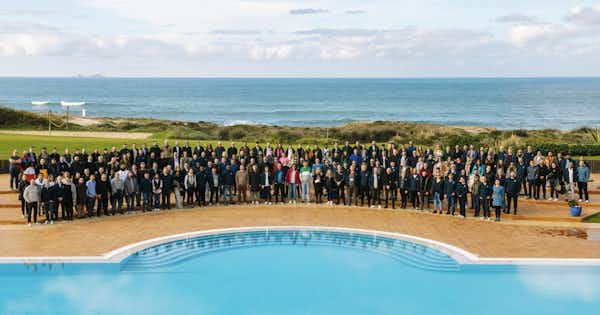Guida alla certificazione della parità di genere in Italia | Scarica il nostro e-book gratuito

People Analytics Tools Promise to Promote Fairness. Do They?
Algorithmic people analytics tools promise to make hiring and promotion decisions easier. However, these tools can sometimes end up recommending biased decisions. So what is an HR professional to do? Join PayAnalytics co-founder Margrét at the WorldatWork Total Rewards conference in San Diego for some real-world insight into how to apply people analytics tools fairly.
HR Analytics Tools and Techniques
It’s always been challenging for HR professionals to make the fairest possible decisions about who to hire, promote, or select for training opportunities. The recent explosion of commercial people analytics tools has filled the market with great solutions to complex HR problems. And these can create life-changing opportunities for the global workforce. There are solutions that screen resumes, select candidates for jobs and promotions, and monitor employee productivity—to name a few.
These tools have great potential — but they can also go very, very wrong. For example, if most employees in a given job have historically been men, an algorithm might “learn” that women are less likely to be successful in that role. The tool might then de-prioritize qualified female applicants. As a result, the employer misses out on a great candidate, and the candidate misses out on a job that’s a great fit.
So how can HR professionals be sure they’re using people analytics tools fairly? This is the question our co-founder Margrét will be tackling on June 13, 2023 at the WorldatWork Total Rewards annual conference in San Diego.
In her forty five-minute talk, Margrét will draw upon her decades of people analytics experience. Her session will also be grounded in the research from the PayAnalytics team’s award-winning 2021 whitepaper on this subject.
Margrét’s presentations will focus on the pitfalls and possibilities of the many tools that have entered the market, and how to avoid and embrace them.
Three Steps: Getting Started with People Analytics Tools
Here’s a sneak peek of a few of Margrét’s recommendations for making the best use of algorithmic people analytics tools:
Take time to understand the organization’s data biases.
These biases can be direct, meaning that the data itself is biased. When biased data is used in any model, it can lead to biased decisions. Bias can also be indirect. This often happens when one measure is used as a proxy for something else. For example, some systems use school grade point averages (GPAs) or test scores as a proxy for intelligence. But those aren’t great proxies. Some students need to work while they’re going to school, which can hurt their GPA. And tests aren’t always accurate measures of what someone has learned.
Know how the models perform across demographic groups.
Models usually perform the best for a majority group. So, many products simply focus on doing really well in predicting outcomes for that group — while not doing nearly as well for minority groups. Data that is not properly balanced can also make models perform badly for members of minority groups. It’s tempting, then, to just remove all demographic variables from the data. But this often doesn’t work because the data still holds factors correlated with demographics.
Margrét will talk about how dashboards can be a tool for revealing weak spots in a model’s performance.
Know what questions to ask product vendors.
Based on her research and experience, Margrét has developed a checklist of questions to ask sellers and developers of people analytics tools. These questions will help HR professionals understand, for example, how a people analytics tool handles data bias, how well it performs for minority groups, and how it reacts to unbalanced or biased data. In general, they’ll help you figure out if a given tool on the market can be integrated into a data-driven decision process that is also bias aware.
Learn more at World at Work ‘23 in San Diego
Join us in San Diego for the Total Rewards conference. Margrét will be speaking on Tuesday, June 13 at 2 p.m in room 6C. Get warmed up with a 1:1 in-person meeting with our pay equity experts, including Margrét, during the conference. Book 30-minutes to get one step closer to achieving pay equity.





